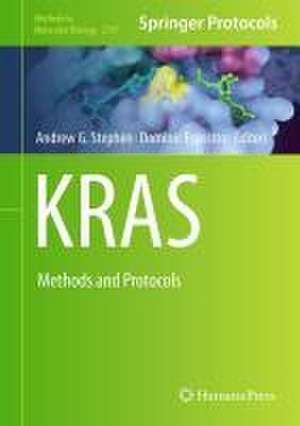KRAS: Methods and Protocols : Methods in Molecular Biology, cartea 2797
Editat de Andrew G. Stephen, Dominic Espositoen Limba Engleză Hardback – 4 apr 2024
Authoritative and cutting-edge, KRAS: Methods and Protocols aims to provide methods that will be instrumental in the development of future clinically approved KRAS therapeutics.
Din seria Methods in Molecular Biology
- 9%
 Preț: 791.63 lei
Preț: 791.63 lei - 23%
 Preț: 598.58 lei
Preț: 598.58 lei - 20%
 Preț: 882.98 lei
Preț: 882.98 lei -
 Preț: 252.05 lei
Preț: 252.05 lei - 5%
 Preț: 802.70 lei
Preț: 802.70 lei - 5%
 Preț: 729.61 lei
Preț: 729.61 lei - 5%
 Preț: 731.43 lei
Preț: 731.43 lei - 5%
 Preț: 741.30 lei
Preț: 741.30 lei - 5%
 Preț: 747.16 lei
Preț: 747.16 lei - 15%
 Preț: 663.45 lei
Preț: 663.45 lei - 18%
 Preț: 1025.34 lei
Preț: 1025.34 lei - 5%
 Preț: 734.57 lei
Preț: 734.57 lei - 18%
 Preț: 914.20 lei
Preț: 914.20 lei - 15%
 Preț: 664.61 lei
Preț: 664.61 lei - 15%
 Preț: 654.12 lei
Preț: 654.12 lei - 18%
 Preț: 1414.74 lei
Preț: 1414.74 lei - 5%
 Preț: 742.60 lei
Preț: 742.60 lei - 20%
 Preț: 821.65 lei
Preț: 821.65 lei - 18%
 Preț: 972.30 lei
Preț: 972.30 lei - 15%
 Preț: 660.49 lei
Preț: 660.49 lei - 5%
 Preț: 738.41 lei
Preț: 738.41 lei - 18%
 Preț: 984.92 lei
Preț: 984.92 lei - 5%
 Preț: 733.29 lei
Preț: 733.29 lei -
 Preț: 392.60 lei
Preț: 392.60 lei - 5%
 Preț: 746.26 lei
Preț: 746.26 lei - 18%
 Preț: 962.66 lei
Preț: 962.66 lei - 23%
 Preț: 860.22 lei
Preț: 860.22 lei - 15%
 Preț: 652.64 lei
Preț: 652.64 lei - 5%
 Preț: 1055.50 lei
Preț: 1055.50 lei - 23%
 Preț: 883.87 lei
Preț: 883.87 lei - 19%
 Preț: 491.89 lei
Preț: 491.89 lei - 5%
 Preț: 1038.86 lei
Preț: 1038.86 lei - 5%
 Preț: 524.16 lei
Preț: 524.16 lei - 18%
 Preț: 2122.34 lei
Preț: 2122.34 lei - 5%
 Preț: 1299.23 lei
Preț: 1299.23 lei - 5%
 Preț: 1339.12 lei
Preț: 1339.12 lei - 18%
 Preț: 1390.26 lei
Preț: 1390.26 lei - 18%
 Preț: 1395.63 lei
Preț: 1395.63 lei - 18%
 Preț: 1129.65 lei
Preț: 1129.65 lei - 18%
 Preț: 1408.26 lei
Preț: 1408.26 lei - 18%
 Preț: 1124.92 lei
Preț: 1124.92 lei - 18%
 Preț: 966.27 lei
Preț: 966.27 lei - 5%
 Preț: 1299.99 lei
Preț: 1299.99 lei - 5%
 Preț: 1108.51 lei
Preț: 1108.51 lei - 5%
 Preț: 983.76 lei
Preț: 983.76 lei - 5%
 Preț: 728.16 lei
Preț: 728.16 lei - 18%
 Preț: 1118.62 lei
Preț: 1118.62 lei - 18%
 Preț: 955.25 lei
Preț: 955.25 lei - 5%
 Preț: 1035.62 lei
Preț: 1035.62 lei - 18%
 Preț: 1400.35 lei
Preț: 1400.35 lei
Preț: 1419.43 lei
Preț vechi: 1494.14 lei
-5% Nou
Puncte Express: 2129
Preț estimativ în valută:
271.64€ • 282.55$ • 224.26£
271.64€ • 282.55$ • 224.26£
Carte tipărită la comandă
Livrare economică 08-14 aprilie
Preluare comenzi: 021 569.72.76
Specificații
ISBN-13: 9781071638217
ISBN-10: 1071638211
Ilustrații: XI, 365 p. 83 illus., 69 illus. in color.
Dimensiuni: 178 x 254 mm
Greutate: 0.88 kg
Ediția:2024
Editura: Springer Us
Colecția Humana
Seria Methods in Molecular Biology
Locul publicării:New York, NY, United States
ISBN-10: 1071638211
Ilustrații: XI, 365 p. 83 illus., 69 illus. in color.
Dimensiuni: 178 x 254 mm
Greutate: 0.88 kg
Ediția:2024
Editura: Springer Us
Colecția Humana
Seria Methods in Molecular Biology
Locul publicării:New York, NY, United States
Cuprins
KRAS as a therapeutic target.- The abundance of KRAS and RAS gene mutations in cancer.- Production of isotopically labeled KRAS4b.- Nucleotide Exchange on RAS Proteins using Hydrolysable and Non-Hydrolysable Nucleotides.- Crystallographic studies of KRAS in Complex with Small Molecules and RAS-binding Proteins.- Considerations around Structure-Based Drug Discovery for KRAS using DOCK.- Measurement of KRAS GTPase activity.- Affinity Measurement of Non-covalent Interactions of the covalent KRAS G12C GDP inhibitor MRTX849 to RAS Isoforms using Surface Plasmon Resonance.- 1D and 2D NMR for KRAS:ligand binding.- Luminescence based techniques for KRAS thermal stability monitoring.- MALDI-TOF mass spectrometry-based assay for measuring covalent target engagement of KRAS G12C inhibitors.- KRAS4b:RAF-1 Homogenous Time-Resolved Fluorescence Resonance Energy Transfer Assay for Drug Discovery.- Biophysical characterization of RAS-SOS Complexes by Native Mass Spectrometry.- Profiling complex RAS-effector interactions using NMR spectroscopy.- Probing RAS Function Using Monobody and NanoBiT Technologies.- Analysis of the guanine nucleotide-bound state of KRAS by ion-pair reversed-phase high-performance liquid chromatography.- Real-time monitoring of RAS activity using in vitro and in-cell NMR spectroscopy.- Studying RAS Interactions in live cells with BRET.- FLIM-FRET Protein-Protein Interaction Assay.- High-throughput cell-based screening of small molecule KRAS signaling inhibitors using a homogeneous time resolved fluorescence (HTRF) assay.- A method to conditionally measure target engagement at intracellular RAS and RAF complexes.- FLAG-KRAS4B as a model system for KRAS4B proteoform and PTM evaluation by mass spectrometry .- Creation of an isogenic H/N/KRAS-less mouse embryonic fibroblast cell line panel derived from a size sorted diploid clone.- Quality Control ofan Isogenic H/N/KRAS-less Mouse Embryonic Fibroblast Cell Line Panel.- A Facile Method to Append a Bio-ID Tag to Endogenous Mutant Kras Alleles.
Textul de pe ultima copertă
This volume details protocols ranging from high yield production metabolically labeled KRAS for NMR studies to approaches that quantify engagement of novel molecules that bind KRAS in live cells. Chapters focus on protein production and characterization, biochemical assays, cell-based assays, KRAS-membrane interactions, targeting KRAS, and cell models. Written in the highly successful Methods in Molecular Biology series format, chapters include introductions to their respective topics, lists of the necessary materials and reagents, step-by-step, readily reproducible laboratory protocols, and key tips on troubleshooting and avoiding known pitfalls.
Authoritative and cutting-edge, KRAS: Methods and Protocols aims to provide methods that will be instrumental in the development of future clinically approved KRAS therapeutics.
Authoritative and cutting-edge, KRAS: Methods and Protocols aims to provide methods that will be instrumental in the development of future clinically approved KRAS therapeutics.
Caracteristici
Includes cutting-edge methods and protocols Provides step-by-step detail essential for reproducible results Contains key notes and implementation advice from the experts
